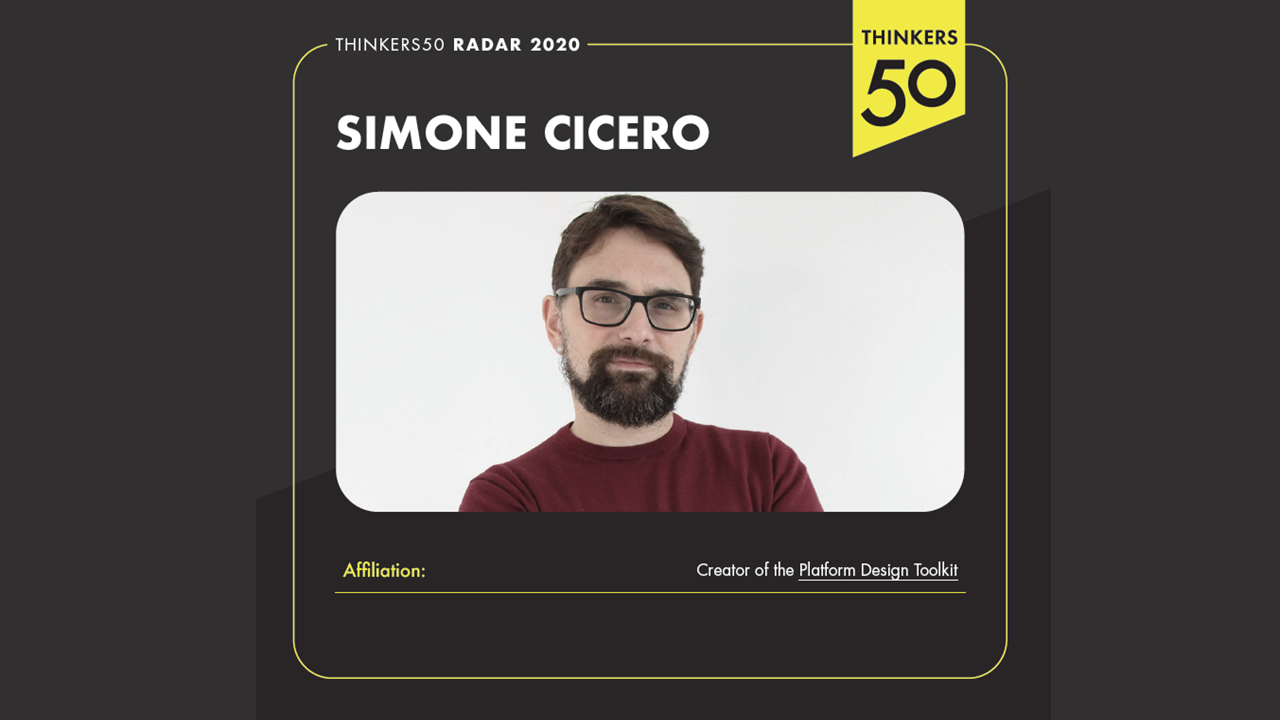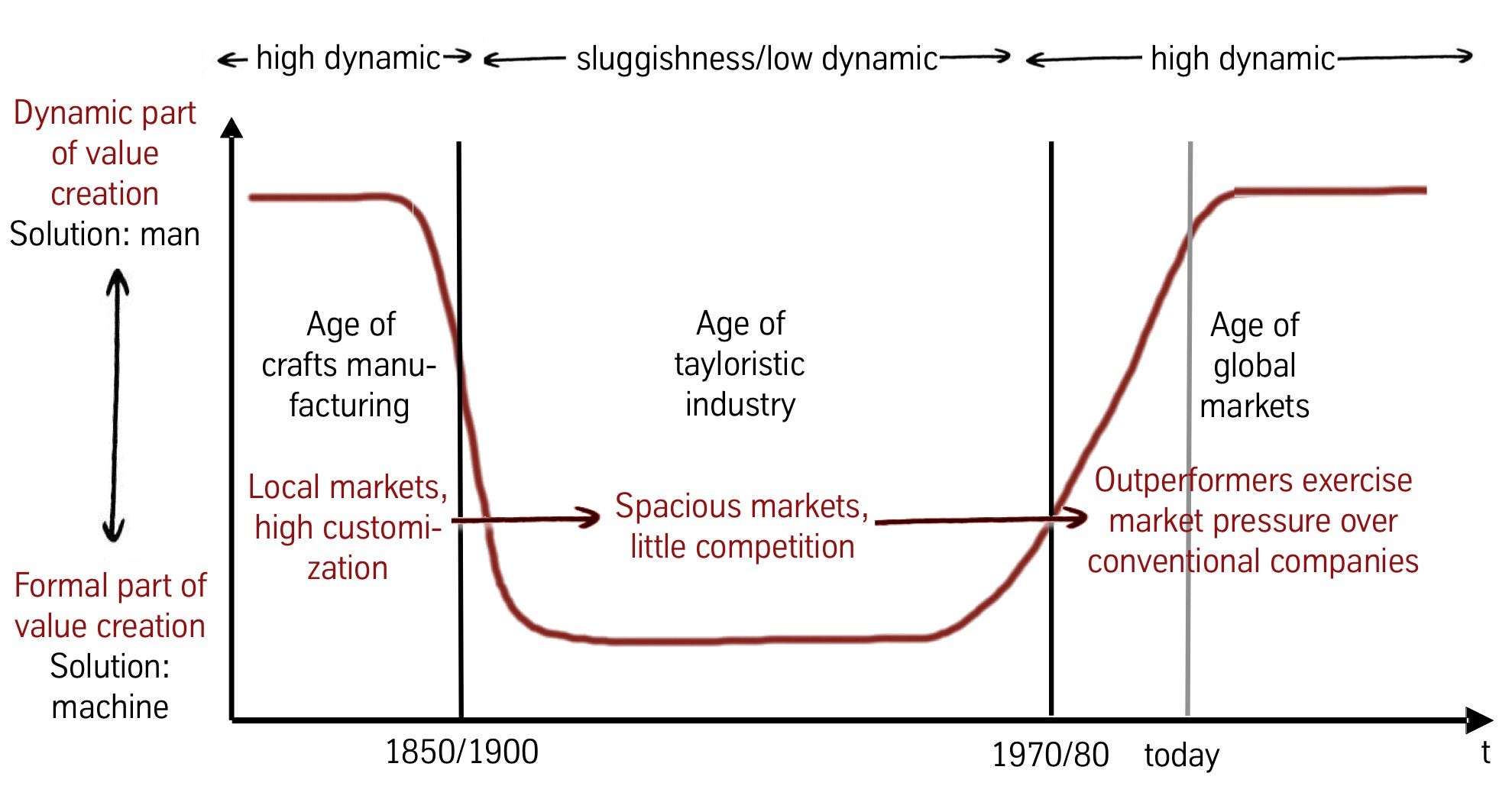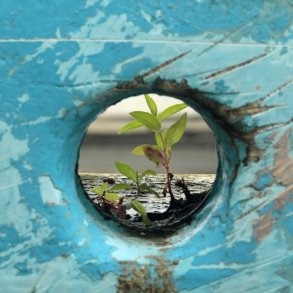By Simone Cicero and originally published on medium.com at stories.platformdesigntoolkit.com
Note from Enlivening Edge Magazine: You might want to check out other highly related articles from Simone Cicero that have been republished in Enlivening Edge Magazine. This recent one from early 2020 is especially relevant. This article was originally published before the world turned topsy-turvy, so “2020” is still a relevant timeframe!
Platform Design Toolkit makes it to 2020 Thinkers50 Radar
This post is brought to you by the team at platformdesigntoolkit.com and is dispatched in our fortnightly newsletter.
On February 4th I’ve been included in Thinkers50 Radar 30 management thinkers to watch in 2020. Besides being flattered by the mention — and by the wave of congratulations received — this offers me a platform (!) and a possibility to share with my community some further thoughts.

But what is this management idea I’m (or better, we are) offering to the world in such a turbulent and challenging time as the start of this new decade?
I’ve been working on business and organizational models based on large scale collaboration for the last 15 years, first with open source software, then open hardware, open knowledge, marketplaces and so it goes.
These — no more just emerging but now affirming — modes of production, based on the facilitation of large scale systems of interaction where different players can play different roles, certainly have a tendency to scale fast and large and give the ecosystem of participants the right space to find and express peculiar and contextual solutions to problems.
Being it the case of a company able to adapt an open-source software to its own necessities maybe by connecting with a local expert, or being it the case of an Airbnb traveler able to find the right spot in the city, so to be near enough to a particular friend, workplace or event; these systems leverage on the pervasivity of technology — perfectly pictured by Ben Thompson in his recent “the end of the beginning” — to make coordination possible anywhere.
… cloud and mobile, which are often thought of as two distinct paradigm shifts, are very much connected: the cloud meant applications and data could be accessed from anywhere; mobile made the I/O layer available anywhere. The combination of the two make computing continuous.
These collaborative, large scale systems (platforms) have shown to be radically superior in many spaces of opportunity, and are posing a substantial threat to existing incumbent organizations.
The major threat though doesn’t necessarily lie — for incumbents — simply in underestimating how these newcomers, based on such a production model, can come up with strategies that can become competitive with the industrial ones but, I’d argue, it lies in not understanding that the industrial age is gone, forever.
Taylor’s bathtub — as depicted by Niels Pflaeging years ago — is indeed a great way to explain what’s happening: we’re now climbing a steep curve that brings the world back to a level of dynamicity, interconnectedness, and unpredictability that simply makes organizations that work according to a traditional command-and-control structure, unfit.

As Mel Conway brilliantly explained us decades ago, a genuine platform transformation won’t end at the business model level: you won’t see an industrial, incumbent, Tayloristic, siloed behemoth come up with a genius idea for the next platform because an organization will likely replicate its internal communication structures when creating new artifacts.
And what’s implied with that? As no boundaries exist anymore between inside and outside an organization, the plummeting of transaction cost doesn’t make the case anymore for the firm that Ronald Coase envisioned almost 80 years ago.
There’s a pressing need to adopt new organizational models that are moe able to reflect and resonate with the world and are able to engage better and more freely with it: it’s more about narratives and less about boundaries, it’s all about small entrepreneurial teams, radical openness, collaboration, distributed decision making, and creative entropy, the capability to let the organization place creative bets from its periphery, with no centralized control so that some of them can bring something relevant to a world in search of new ways.
If you’re still defining your organization for what it is doing today — from the inside — and you didn’t understand that is the arena, as Rita Gunther McGrath would say, or better the ecosystems as I would say, that defines it from the outside in, you’re sitting on a train that is destined to irrelevance.
As power shifts from the organization to the ecosystem, any organization needs to learn how to be worth existing: the only way to be as such is to make the ecosystem achieve it’s relational and learning potential faster, sustaining scalable relationships and providing opportunities and support services for scalable learning. That’s what a platform strategy is all about.
At the same time, despite we’re perfectly sure that platform-based, ecosystem centric organizational models are the forms of organizing most adaptable to such an interconnected, zero-transaction-cost world, we also feel that just cheering up with that is not enough: in a few words, we know that “Ecosystems won’t solve the Management Crisis of the 21st Century”.
Ecosystems won’t solve the Management Crisis of the 21st Century
Confessions from the Global Peter Drucker Forum 2019
stories.platformdesigntoolkit.com
Our hyper rivalrous world, where we’re always in competition, is changing abruptly: we face as a whole society, and as a species, a number of existential threats that are even hard to keep track of. Climate change and habitat degradation, mass extinctions, increasing warfare, the dawn of a AI, menaces of bioterrorism, new diseases, and more: all these factors threaten to halt the powerful (but ridiculously fragile and interconnected) globalized economy that we built over the years of the industrial age.
Voices supporting the need to reimagine the economy from the ground up abound: not just the industrial age seems gone, it seems that we also need to confront with unlearning and re-learning, and let sink in the fact that there are many of our epistemic frames that need to be questioned.
Our organizations need to be un-framed from the unsustainable constraints of rationalism, progress, modernity. Understanding how to lay down new foundations to the theory and practices of organizing in this new world IS the challenge we must to be up for: no retreating is possible, no safe space is available, this is a story we need to engage with, by writing new chapters.
As the filters that we have always used to simplify our ways of relating, to find refuge from the astounding, intrinsic, unbearable-ness of living on an alive and interdependent planet, part of a universe of which the laws we don’t even understand completely, are faltering, change becomes the only option.
Only a certain amount of change though, in the way we relate with the world, can be proxied to our modes of organizing and to our organizations: such a transformation is not only a transformation in management, or in *management ideas*, but it needs to be a transformation in how we perceive and expect to interact with others — and nature — as humans, employees, entrepreneurs, consumers, and citizens.
If my work as part of our team and community will be to help organizations and teams not just to drink the kool-aid of platforms and ecosystems but also to ask the hard questions, and understand how those questions influence the very idea of organizing and managing in the 21 Century, this, will be our “dent in the universe” for what’s worth.
In the meanwhile, as my friend, Joe is used to saying: onwards fellow humans.
“Although responsible use may be defined, advocated, and to some extent required by organizations, it cannot be effectively enforced by them. The use of the world is finally a personal matter, and the world can be preserved in health only by the forbearance and care of a multitude of persons.
“That is, the possibility of the world’s health will have to be defined in the characters of persons as clearly and as urgently as the possibility of personal “success” is now so defined. Organizations may promote this sort of forbearance and care, but they cannot provide it.”
Wendell Berry — “The Unsettling of America: Culture & Agriculture”

Click on the picture [on the original webpage] to connect if you want to work with me and the rest of the team to explore and understand what the Platform-Ecosystem landscape means for you and your organization or explore the learning opportunities we provide to professionals to meet our growing community of practitioners worldwide.
Before You Go!
As you may know, everything we do is released in Creative Commons for you to use. In case you’re getting value out of these reads and tools, we encourage you to click the 👏button and hold down to 20–50 claps [on the original webpage] as this will help us to get more exposure, and hopefully, work more on developing these tools.
If you liked this post, you can also follow me on Twitter, I normally curate this kind of content.
Thanks for your support





Well said and described, Simone! I’ve been working on the same issues for the past 20 years eventually developing We Space Theory. Onward!